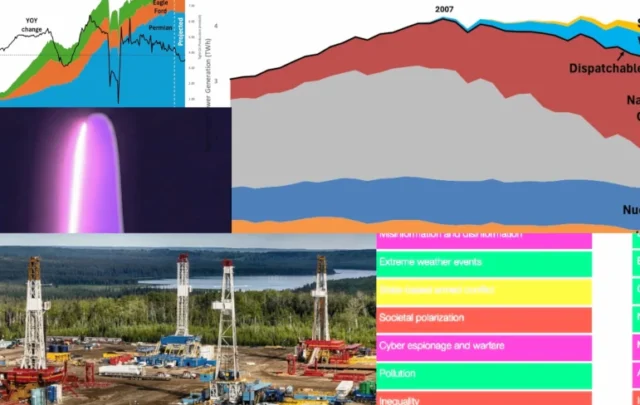Let’s start with the premise that resource scarcity and rising costs cause the global economy to contract. Let’s not be concerned here with the timing, but consider what can be expected and what our adapting strategies should be to conditions that force descent.
There are many new words being used for this future scenario, such as decession, the opposite of succession.The expectation of general systems concepts of self organization for any system is a rhythmic alternation between slow production, growth and succession followed by a pulse of consumption, descent and decession. Pulsing on each scale is an accumulating build up of products converged to centers, followed by descent with sharp, short diverging dispersal.
Many assume that the only way down is to crash and restart. But many systems program orderly descent and decession that is followed later by growth and succession again. For example, in the past, ecosystems and human cultures in northern latitudes expanded and contracted seasonally. They decreased populations, stored information, and reduced function with such mechanisms as spore and seed formation, hibernation, migration, and staging inactivity and rest.
The following are changes that accompany descent. Either we adapt with deliberate process or have these changes forced on us with damaging repercussions. Although we can’t predict how societies will react, we can use quantitative resource evaluations to characterize what is possible. For each of these changes, some suggestions are made that could make descent less traumatic and more prosperous. Many of the changes are in progress.
1. Population and Relocation
Necessary Population Reduction: To sustain a reasonable standard of living (emergy per person), population has to be reduced at the same rate as the rate of resource use. Since population growth momentum may overshoot the time of descent, to sustain the emergy per person requires rapid decrease in population. Either people reproduce less or be reduced by starvation and disease like that evident in Africa.
In most developed countries couples are limiting their families to one or two children. This decision is made by each family on the basis of the cost of raising and educating children. Multiplied by many families this decision adds up to a nation-wide reduction in reproduction. Populations in these developed countries would be decreasing except for immigration.
In the underdeveloped world populations are still increasing. It has been found that the most effective population control in poorer nations is to give women the rights to property, employment, and the means to start their own small businesses. Of course, the distribution of birth control devices is also necessary.
Decrease in Urban Concentration: The extreme concentration of economic enterprises and people in cities is based on cheap fossil fuels. Concentrations and populations are many times greater than can be supported by the surrounding landscape alone. As fuels become less available and cost more, cities have to diminish, eventually to the size compatible with their support area. Some industries are already moving to areas where there is more space, cleaner air and water, and land for workers’ housing.
To deal with the changes expected, the governments of cities and counties need to be combined so that an area and its population centers are managed and taxed as a single system. Private and public enterprises may develop that use the abandoned urban structure to reconstruct smaller less concentrated centers.
2. Policy on Fuels
Eliminating Wasteful Consumption without Reducing Empower: To simply limit resource use, is not a useful policy since it goes against the maximum empower principle of self organization. But limiting luxury and wasteful uses, allows resources to go into productive functions and is adaptive. Thus, measures to limit unnecessary horsepower stimulate the economy, whereas taxing or limiting useful resource uses is not a viable option.
Declining Dominance of Automobiles: Rising fuel costs and general pressure for greater economic efficiency is likely to reorganize the automobile cultures of the developed nations. First there can be reduction of unnecessary horsepower, followed by reduction of autos. Private cars save individual time, but other measures can substitute including more use of communication in place of transportation, people moving closer to work, and more shopping on line.
Global Greenhouse Climate Changes: There are current efforts now to reduce greenhouse gases that are changing the climate. Immediate ways to help without reducing economic activity include reducing private car horsepower in developed countries and pushing a global effort to reforest the depleted lands of undeveloped countries. As soon as global fuel consumption begins to decrease (as its scarcity and costs increase), the earth processes of carbon-dioxide uptake will start to restore a balance between carbon-dioxide release from fuel consumption and carbon-dioxide uptake by eutrophic plant photosynthesis, the carbonate buffer of the ocean, the alkaline soils, and the weathering of rock.
3. Environment and Agriculture
Increase of Lower Intensity Agriculture: Rising fuel costs forces agriculture toward a lower intensity with less technology, fertilizer, and pesticide and more labor, provided by people leaving the cities where employment is decreasing. Diverse crop varieties that are more self sustaining will have to be restored, even though their unit productivity may be less.
Changed Role of Environment: During the time of fossil fuel based growth, there was matching use of environmental resources, water diversion, soil loss in industrial agriculture and stripping of old growth forests. Overfishing, forest losses, and depleted soils are already widespread. As the use of fossil fuels decreases, the economy has to shift once again to a smaller, agrarian base.
However, during the transition and turn-down there could be frantic, competitive stripping of the environmental stocks needed for maximum production. To prevent collapse, demand on environment has to be reduced and reorganized during descent.
Soils and forests are renewable, but only with slower rotations than operated by our present economy. We can let fields go fallow for seasons, cut and replant forests on renewable cycles, and let swamps build peat and filter to sustain water quality. These are ways to keep slowly-renewable materials available.
4. Information and Electric Power
Peace and Maximum Empower by Global Sharing of Information: When essential information is broadly shared on a large scale, it becomes long-lasting, a unifying mechanism. Information sharing can replace the restrictive information competition of growth capitalism.
Television and the internet have changed the global organization away from military territorialism. If global ethics for equitable trade and sharing information can prevail, global empower and peace can be protected by the information mutualism that maximizes empower. The dangerous alternative is fragmenting societies warring for residual resources.
Selected Saving of Civilized Culture: Information seems ethereal and remote from biological and industrial processes. But because information requires many energy transformations, there are limits to the amount sustainable. Information capacity declines with diminishing resources. Also, information loses utility and retrievability as it accumulates. Like the brain, society has to select and condense the clutter of short term memory into fewer items of long term memory. The universities are the main institutions with this capability.
Priority Use of Hydroelectric Power: To continue the essentials of the world’s civilization requires that global information networks be sustained. But this requires a priority in allocating electric power at a time when electric power from fossil and nuclear fuels becomes more expensive. Strip mining for coal will conflict with the need for agrarian production of food and fiber. It seems likely that centers of civilization will reorganize around the foot of mountains with hydroelectric power, thus using the high net emergy contributions of the earth.
Full development of hydroelectric power reduces the food potentials of salmon and other migratory fisheries at a time when there may be overpopulation and shortages of protein foods. One of our watershed evaluations found greater empower in a river’s hydroelectricity than in its salmon runs. Since the prosperous way down depends on sharing a global information network, electricity must have high priority. The prosperous way down may well depend on society’s ability to give priority to the greater need for geographic coherence of the larger scale.
5. Capitalism
Decrease in Growth Capitalism: When there are resources to develop, rapid competitive growth of a few enterprises prevails. In ecosystems this is called eutrophic overgrowth by weeds. In the economy, this is growth capitalism. Those developments with investment loans outgrow those without the more rapid start. When there are few undeveloped resources, a no growth system of higher diversity prevails because it is more efficient and better at recycling materials. Enterprises with loans to repay are then at disadvantage.
Descent Capitalism: During descent, new versions of capitalism may appear. Enterprises may be initiated to organize the contraction of the economy using the stored assets as the resource for organizing a smaller economy. There are already some specialists at downsizing. In analogous equivalents in ecosystems, new generations are fueled with the storages of a previous annual cycle.
Decrease in Unearned Income: During growth, capital earns high interest as enterprises pay back loans and dividends. People with money have large incomes for which they did no work for the system. After growth, unearned income decreases. A system is more efficient if money is paid for real work.
Change in Development Policies: When unused resources were available for development, laws developed that maximized competitive capitalism and growth (because monopolistic overgrowth maximizes empower at that stage of succession). Examples are sale and use of public lands for profit; priority rights for mining over surface land use; and corporations given the same constitutional rights as individuals to exploit economically. After growth, such development accelerating laws are likely to change.
As efficiency becomes a recognized priority, measures to eliminate luxury and waste may be recognized in law and policy. One proposal is to establish a limit to personal income at about $150,000 per year. A policy suggested for downsizing reduces income of all personnel in place of the common practice now of reducing the number of employees.
Stock Market Transformation: When most growth is over and the public realizes the fundamental change, a destructive stock market crash is possible. Some mechanism is needed to program a gradual, non-catastrophic deflation of the money held in stocks and bonds. For example, an economy-wide stepwise limitation of interest and dividend rates could shift money from stocks and bonds to ownership and efficient operation of those productive enterprises with good annual yields.
Private Enterprise with Public Control: To maximize system prosperity, private production must include public benefit needs in its operation and pricing (not only make the most for the lowest cost to sell for the highest price). Private business can be required to add the costs of environmental protection and social equity costs of recycling materials, restoring land, and replacing destruction. Minimum wages and benefits need to be included in the costs. These costs are not a burden to an individual company if required of all competitors.
Developing Trade Equity: Because the money from developed countries buys more real wealth in trade with more rural countries, the present free trade is not equitable (because of differences in emergy/money ratio). It accelerates the weedy over-growth of developed countries, which is appropriate only in early growth stages. Developing equity (equal emergy in international exchanges) allows more countries to make maximum contribution to global empower. Trade treaties can be used to adjust prices, subsidies, foreign aids, information and other types of exchange to be equal.
6. Structure and Materials
Replacing Flimsy Housing with Fewer Buildings of Quality: In ecological succession where there are unused resources available, the initial structures are flimsy and temporary but effective at maximizing growth. Later they are replaced by larger, substantial, longer lasting, slow turnover assets. A similar evolution of buildings is expected and can be planned. Trailers and frame buildings with short life times will be replaced by those with substantial permanent structure and less maintenance cost, a process that is more advanced in Europe. As soon as populations decrease, there will be excess building space which can be converted into fewer, more permanent structures,
Reuse, Recycle of Materials, and Recycle to Ecosystems: Efficient, maximum production requires that everything be reused or recycled (not accumulating in dumps). The kind of recycle of materials depends on the concentration and quality (transformity). The free market can deal with high quality and concentration, but the ecosystems are required for the low concentrations. To encourage conservation and reuse of materials, some manufacturers are being required to take back the materials they used in the packaging of their products. This plan saves materials and reduces waste dumps.
Communication Replacing Transportation: We can save the resources and costs of transportation by using more email, phone mail and fax in place of personal trips and standard mail. More jobs can be done on computers at home. These too have extensive energy requirements, but less than transportation with automobiles.
7. Human Life
Minimum Standard of Living: Systems principles suggest there is a natural hierarchy in the distribution of wealth that is functional. However, there is a minimum basic standard of food, shelter, education, health care and other necessities for each person to be productive.
Women, Children, and Work: During descent fewer children are needed but more people will be required to do the work that is less aided by the more expensive fossil fuels. Women can have fewer children and more education for longer careers of productive employment. Societies making these changes promptly will prevail because of their greater efficiency.
Flexibility Regarding Sex: The powerful sex drives of the human species are genetically inherited and thus not easily changed. However sex can be decoupled from reproduction and used more for satisfying the emotional needs for close personal relationships. The rigid mores channeling sex into children are already being replaced with attitudes and laws that allow flexibility in sexual relationships and programs of birth control.
Education for the Future: To prepare children for their lower energy future, we must describe and explain it to them. They need to know why it’s happening and how they can fit into it. A course on how to see the world as a functioning system should be required. They will need to know how to manipulate information and computers. But, they will also need experiences in practical living, like how to grow edible food, how to repair rather than throw-away, and how to make housing more permanent.
Family Values: Some values and lifestyles have to change with the need for fewer children, decreased family resources, and fewer cars. Children continue to need stable family relationships. Communities can reorganize around smaller neighborhood schools. The ethics of large scale unity needs to be added to the small scale ethics of traditional religions.
Local Societies and Pluralism: With less transportation there is opportunity for more social organization locally and cultural diversification as viewed globally. Developing more separate local cultures is not incompatible with global coherence providing all groups retain the ethic of global awareness, cooperation, and mutual respect.
Summary
Principles that appear to govern all systems including human societies were used to consider the time of economic descent ahead. These include the energy laws, the maximum empower principle, the universal energy hierarchy, the conservation and hierarchical distribution of materials, the spatial organization of centers, and the pulsing paradigm.
We expect much of the culture and public policy appropriate for the growth period to be replaced with a new set of ethics and policies affecting each scale of time and space during descent.
Decisive changes in attitudes and practices can divert a destructive collapse, leading instead to a prosperous way down.
*Presentation at the International Workshop on Advances in Energy Studies, Porto Venere Italy, May 2000; extracts from a book in press, “The Prosperous Way Down”. The University Press of Colorado, Boulder, Colo. www.amazon.com/exec/obidos/ASIN/0870816101/brainfood.a























